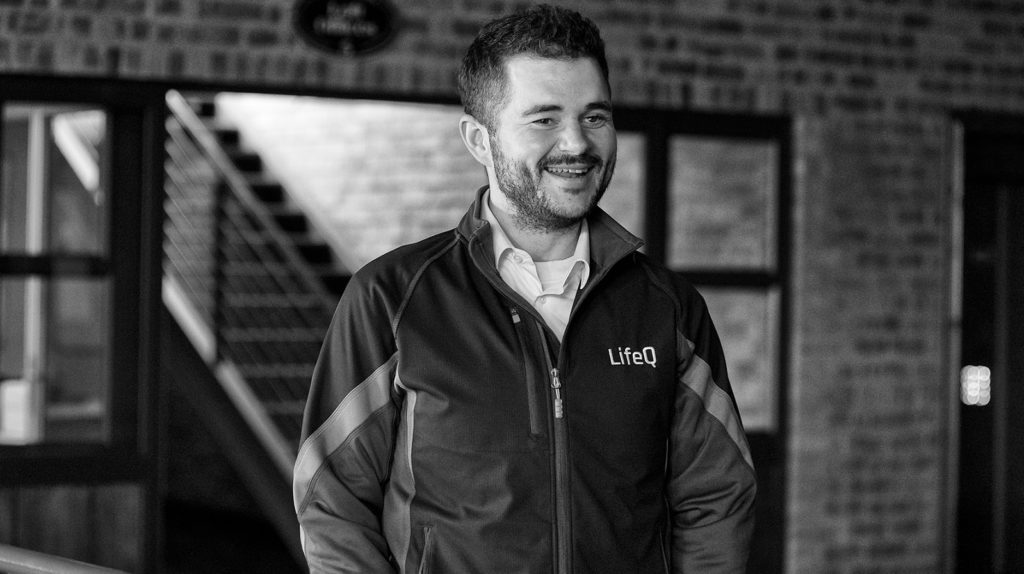In a pioneering effort to tackle South Africa’s growing digital divide, WeThinkCode_ and South Cape TVET College have partnered to roll out an 18-month…
EXCLUSIVE: We’ve shut down SA startup HealthQ, confirms CEO

Stellenbosch based tech company HealthQ will be shut down, as part of a restructuring involving its sister company US based biotech startup LifeQ, HealthQ and LifeQ co-founder Riaan Conradie has confirmed to Ventureburn.
Ventureburn approached Conradie (pictured above), who served as HealthQ CEO, for comment this week after receiving a tip-off from a reader who earlier this week forwarded the publication an email he had received from a recruitment company.
In the email a local recruiter writes: “XXXX (name removed — Ed) is previously (sic) worked at HealthQ, unfortunately, the company liquidated. That’s why we were seeing so many CVs from them.”
It is understood by Ventureburn that HealthQ’s directors have already sent an email to shareholders and staff informing them that company would be shut down.
HealthQ Technologies was founded in 2010 by Conradie (pictured above) and Laurie Olivier. Conradie is now based in The Netherlands, while Olivier is based in Atlanta, Georgia. The two subsequently founded LifeQ in 2014.
The decision to shut HealthQ was part of a restructuring of sister company LifeQ, says co-founder Riaan Conradie
HealthQ has up till now been contracted to carry out development work for LifeQ, the latter which says it uses computational systems biology and continuous body monitoring to gather data from which users can draw insights about their own personal health.
‘We are restructuring LifeQ’
In two lengthy emails to Ventureburn this week, Conradie explained that the decision to shut down HealthQ is aimed at restructuring LifeQ towards maximising shareholder value.
He explained that HealthQ had been operating as a for-profit entity providing research and development (R&D), scientific testing and validation services to LifeQ, as part of a standard services agreement between the two entities.
“LifeQ was its main client, and other clients did not contribute significantly to its revenue,” he added.
He said LifeQ has operations in the US, The Netherlands and Ireland, with the majority of the LifeQ leadership residing in the US entity.
Explained Conradie on the reason for shutting down HealthQ: “LifeQ is graduating to the next phase in the business life cycle, and we are now transitioning from R&D to commercial scaling.
“As such LifeQ has undergone a global restructuring towards ensuring we can best execute on a range of contracts with several consumer electronics, insurance and most of the five big tech companies towards maximising shareholder value and achieving our vision.
“Henceforth LifeQ prefers to hold direct relationships with all its human resources including, where relevant, individuals previously employed by its contracting entities.
He said it was towards this end that LifeQ terminated its service agreement with HealthQ Technologies. “HealthQ is in the process of filing for business closure, and the company does not have any outstanding creditors,” he added.
The decision to shut HealthQ, he said, has been done with the support of its directors.
‘Majority of staff not laid off’
However, he declined to reveal how many jobs would be affected and what revenue, if any, HealthQ was generating when it was shut.
It’s not clear how many staff the tech company has. In all, HealthQ has 48 employees listed on LinkedIn.
Explained Conradie in one of the emails: “Unfortunately I cannot elaborate on the magnitude of the revenue or staff numbers, but I can mention that the majority of the HealthQ Technologies staff have not been adversely affected”.
When questioned whether this meant that HealthQ Technologies staff had been laid off or not, he responded in a subsequent email that the “majority” of HealthQ employees have been offered employment at LifeQ.
“HealthQ is the largest services provider to LifeQ, and accordingly, upon closure of HealthQ, LifeQ has reached out and offered direct contractual services arrangements to the majority of HealthQ employees in order to retain the talent that has evolved a deep understanding of the LifeQ offering and technology.
“This process is ongoing and secures to LifeQ more direct control over the commercial execution of its global contracts with some of the foremost entities in the world.
“Most of these contracts involve joint development work and are under strict non-disclosure agreement and we can unfortunately not provide more details on these at this stage. As these contracts approach market release, we will update you with more context and colour,” he said.
One HealthQ employee that Ventureburn contacted revealed that a third-party cession audit firm had been brought into the business.
When asked to comment on this, Conradie said in a subsequent email that the directors of HealthQ had appointed an audit firm to ensure that the company follows an orderly closure process. “There is no investigation, but only good governance for the sake of all stakeholders,” he added.
LifeQ deals
Turning to the progress of LifeQ, Conradie said the biotech startup had in 2018 concluded a deal with Momentum Metropolitan Holdings, and that the insurance company had subsequently launched a product, called Kimi, to the market.
“We have also, together with Samsung and Hannover Re, created a new product called VeoSens. VeoSens will launch with a South African entity in the first week of April. Unfortunately I cannot elaborate on this, because of the sensitivity of the launch,” he said.
However, he said there was “no doubt” that the launch of the product by the insurance company will “make a significant splash towards the end of March or beginning of April”, adding that he and his team is “super excited about this”.
He pointed out that LifeQ has continuously raised capital over the past years to ensure that the company is able to deliver on the “prominent B2B contracts”.
“Many of these large secured contracts are finally being converted into revenue — hence the rethink on organisational structure and focus,” he said.
‘Extreme emotional strain’
He said the restructure has placed “extreme emotional strain” on the founders and employees involved.
“Sometimes doing the right things are the hardest to do, and there is never a good time to do these things.
“I can, however, with confidence say that LifeQ is doing what is required to maximise shareholder value, stay on mission to positively impact human health, and to graduate from an R&D focused entity to a commercial entity with a long list of contracts with some of the most prominent companies in the world,” he said.
‘Struggled internationally’
While Conradie said he could not disclose any information about LifeQ’s investors and the investment raised, it’s understood that LifeQ has raised tens of millions of dollars in investment so far from over 100 investors.
The investors include Cape Town based venture capital (VC) fund 4Di Capital — of which Olivier is a founding partner — and European investment organisation U-Start. It’s unclear who the other investors are.
One SA healthtech founder, who asked not to be named, reckoned LifeQ had raised between $20-million to $30-million, but had “burnt a lot of capital” having struggled against international competition.
Commenting on the figure of how much the startup had raised, 4Di Capital’s general partner Anton van Vlanderen — without divulging the true amount — however said the figure was “over $30-million”. Over 100 investors have invested in the startup, he said.
U-Start, which lists on its website that it has offices in Milan and Switzerland, did not respond to a message sent via its website or respond to calls from the phone numbers listed on its website.
When approached for comment on Tuesday (10 March), Zachariah George, a partner at Startupbootcamp Cape Town (SBC Afritech) who facilitated the U-Start deal, said he was “equally surprised” to hear about the closure recently.
“I’ve sent Riaan an email to clarify but haven’t heard back from him yet. Hopefully we can get to the bottom of this. I know for a fact that LifeQ is still very much operational,” he added.
‘Psychotic management’
When Ventureburn contacted HealthQ’s offices on Monday there were still employees at the office and the phone was answered by a staff member.
When Ventureburn asked to speak to LifeQ vice president of finance Thinus Gerber, Gerber declined to comment at the time saying “we don’t want to comment on that process”.
While most employees Ventureburn approached referred the publication to Conradie for comment, one employee said HealthQ staff were “in the middle of waiting for some sort of severance pay out”.
“And regardless of what is being done legally, ethically and morality wise, the way things were handled here and the mismanagement in my opinion, is absolutely shocking and bordering on bi-polar, psychotic management.
“Whatever I say at this stage, seems like I’m venting and angry,” said the employee, who declined to be named.
Read more: 7 South African healthtech startups to watch in 2018 [Digital All Stars]
Read more: LifeQ inks deal with Garmin for digital health solution
Read more: Groundbreaking health tech company LifeQ finally launches globally
*Correction: We initially had it that LifeQ’s over 100 investors had invested in the startup via 4Di Capital and U-Start. However, subsequent to the publication of this article, 4Di Capital’s Anton van Vlanderen clarified that 4Di Capital is just one of the over 100 investors. The story has been corrected to reflect this.
Featured image: LifeQ and HealthQ co-founder Riaan Conradie (Supplied)

